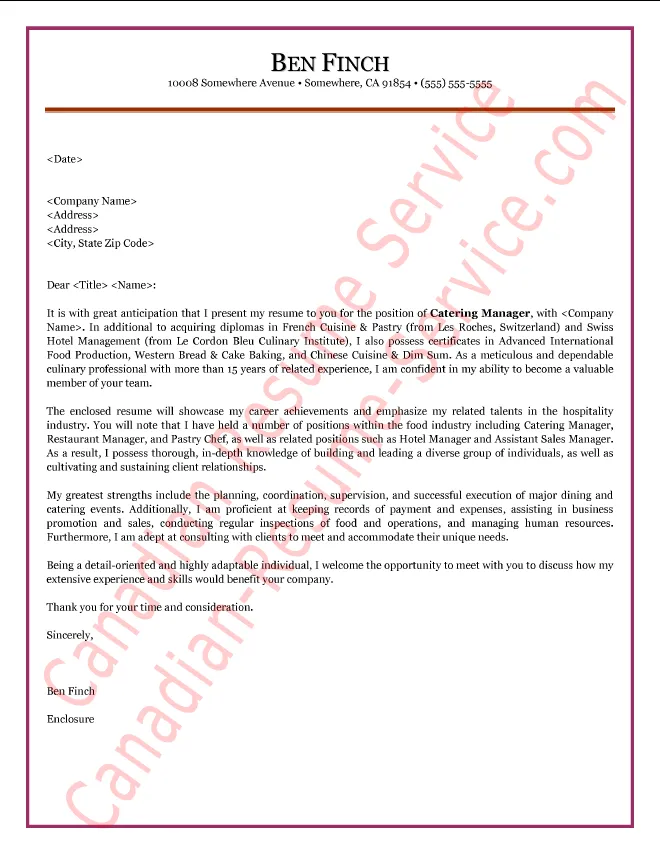Crafting the Perfect Hospitality Cover Letter
A well-crafted cover letter is your first chance to make a positive impression on potential employers in the competitive hospitality industry. It serves as a crucial tool to showcase your personality, skills, and enthusiasm, setting you apart from other applicants. This guide will help you navigate the essential elements of writing a compelling cover letter that effectively highlights your qualifications and increases your chances of landing your dream job. It’s more than just a formality, it’s a strategic opportunity to demonstrate why you are the perfect fit for the role and the company. We’ll delve into the intricacies of presenting your experience, skills, and passion in a way that captivates the reader and encourages them to invite you for an interview. Your cover letter should not simply reiterate your resume; it should provide context, demonstrate personality, and express genuine interest in the position and the organization.
Understanding the Hospitality Industry
Before you start writing, it’s important to understand the nuances of the hospitality industry. This sector encompasses a wide array of roles, from hotel management and restaurant service to event planning and tourism. Each area demands specific skills, but all share a common thread a commitment to providing excellent customer service and creating memorable experiences. Researching the specific role and company you are applying for is crucial. Understanding the company’s mission, values, and recent achievements will allow you to tailor your cover letter to their specific needs. This preparation enables you to highlight the skills and experiences most relevant to the position and demonstrates your genuine interest, which can significantly boost your application. Moreover, understanding current industry trends, such as sustainability, technological integration, and personalized guest experiences, will give you an edge by allowing you to showcase your awareness of these important developments.
Highlighting Relevant Skills and Experience
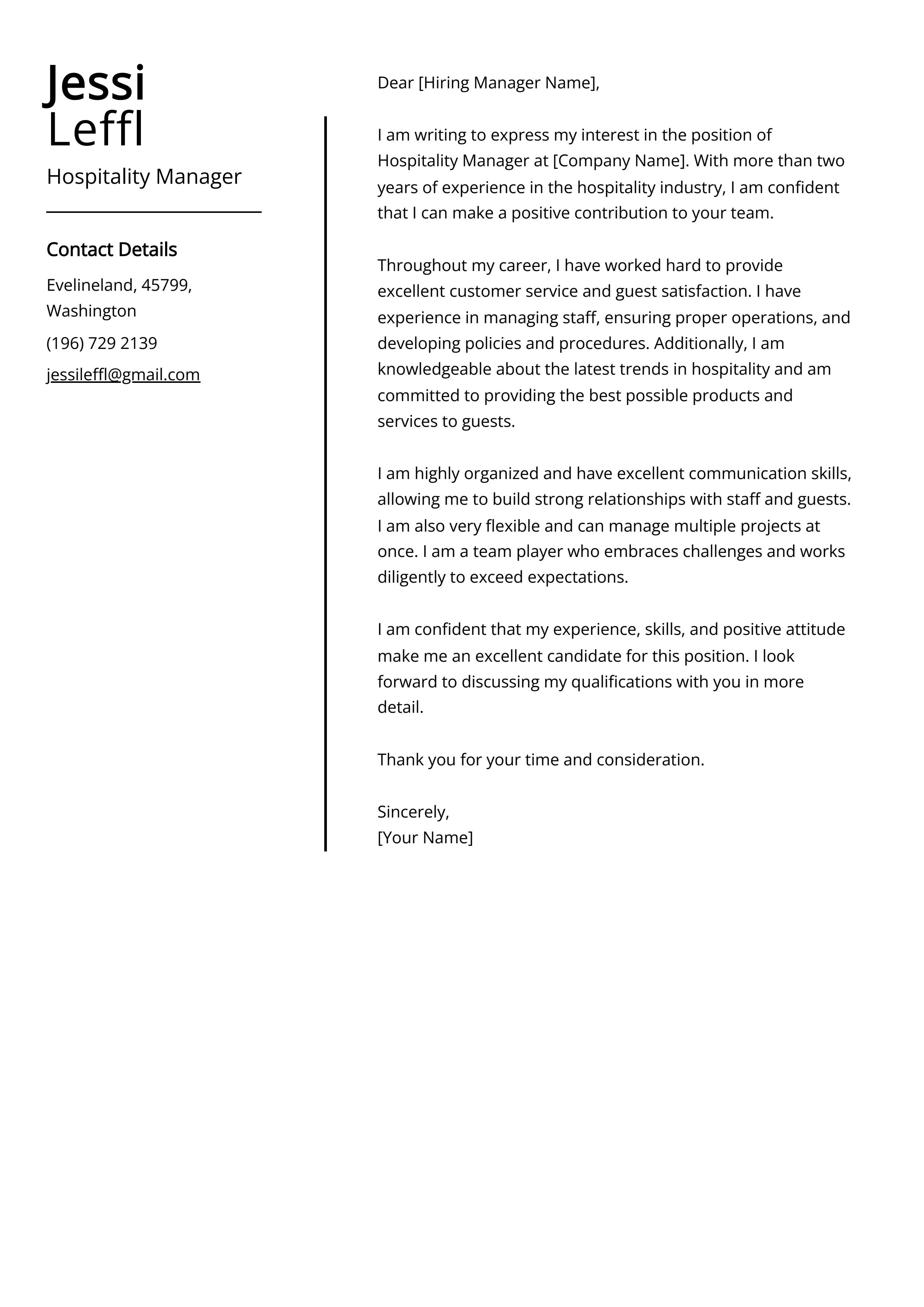
Your cover letter is the place to showcase the skills and experiences that align with the job requirements. Focus on the specific skills mentioned in the job description and provide concrete examples of how you have utilized them in the past. Don’t just list your skills; illustrate them with stories. For example, instead of saying ‘I have strong communication skills,’ describe a situation where you successfully resolved a customer complaint or trained a team. This approach allows the hiring manager to visualize your abilities and understand your potential. Always align your experience with the specific role. Even if your past experiences are not directly related to the job, highlight transferable skills such as problem-solving, teamwork, and adaptability. Tailor each cover letter to the specific job, emphasizing those skills and experiences most relevant to the role, ensuring your application is both relevant and compelling. Use action verbs to clearly define your experiences.
Showcasing Your Passion for Hospitality
Expressing your genuine passion for the hospitality industry is essential. This industry thrives on enthusiasm and a commitment to providing outstanding service. Your cover letter should convey your love for creating positive experiences for guests. Explain why you are drawn to hospitality. What motivates you to excel in this field? Did you grow up in a family that values hospitality? Share personal anecdotes that highlight your understanding of the industry’s core values. Consider discussing what excites you about working in this environment. This might include the opportunity to interact with diverse people, the fast-paced nature of the work, or the satisfaction of exceeding customer expectations. Demonstrating your genuine enthusiasm will help you connect with the hiring manager on a personal level, making your application more memorable and appealing. Show how your personality is a great fit for the hospitality industry.
Tailoring Your Cover Letter to the Job
Generic cover letters are easily dismissed. To stand out, meticulously tailor each cover letter to the specific job you are applying for. Start by carefully reading the job description. Identify the key requirements, skills, and qualifications the employer is seeking. Use this information to customize your cover letter, highlighting the experiences and skills that directly align with the job’s needs. Be specific. If the job description emphasizes teamwork, provide examples of your collaborative efforts. If it values problem-solving skills, share instances where you successfully resolved workplace challenges. Customize your letter to reflect your understanding of the position and the company. Mentioning specific projects or initiatives related to the role will further demonstrate your interest and suitability. Ensure every aspect of your letter reinforces the fact that you are the perfect candidate for this particular job.
Researching the Company and Culture
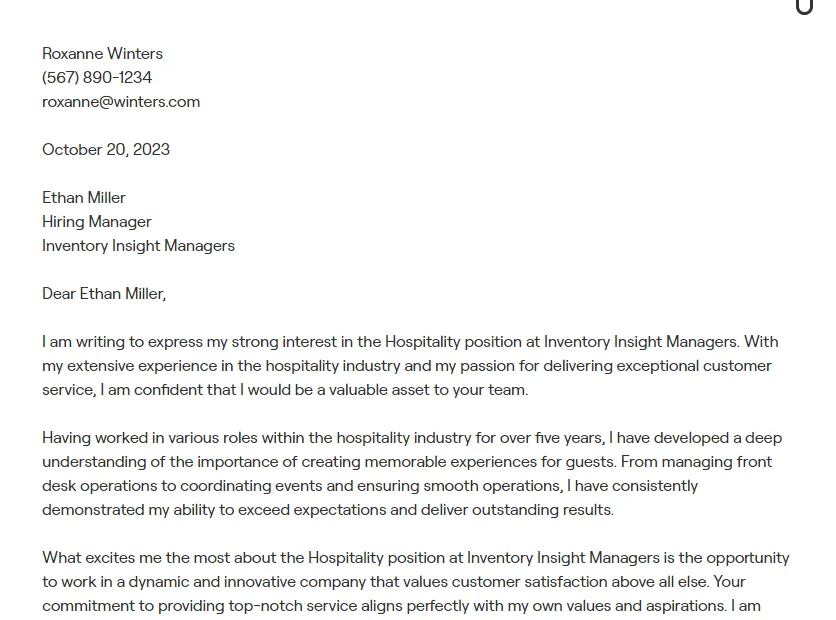
Demonstrating your knowledge of the company and its culture is a significant advantage. Before writing your cover letter, conduct thorough research on the company. Explore their website, social media channels, and any recent press releases. Understand their mission, values, and recent accomplishments. This research enables you to tailor your cover letter to align with the company’s specific needs and demonstrate your genuine interest. Show you understand their values and how your skills will contribute. Mention any specific initiatives or values that resonate with you. Highlight how your experience and skills can help the company achieve its goals. Showing you’ve done your homework demonstrates initiative and can help you make a positive impression on the hiring manager. Knowing the company’s culture will help you to show that you are a good fit.
Formatting Your Hospitality Cover Letter
The format of your cover letter is just as important as its content. A well-formatted cover letter is easy to read and demonstrates your attention to detail. Use a professional font such as Times New Roman, Arial, or Calibri, and maintain a consistent font size (11-12 points) throughout the document. Structure your letter with clear sections, including a heading, opening paragraph, body paragraphs, and a closing paragraph. Use appropriate spacing between paragraphs to enhance readability. Ensure there are no grammatical errors, typos, or formatting inconsistencies. The tone of your letter should be professional but also personable. While the goal is to stand out, avoid overly casual language. The layout should be clean and uncluttered, using bullet points to break up long blocks of text, if needed. Proper formatting showcases professionalism and attention to detail, which are crucial in the hospitality industry.
The Ideal Structure of a Hospitality Cover Letter
A well-structured cover letter follows a logical flow, guiding the reader through your key qualifications. Start with your contact information at the top, including your name, address, phone number, and email address. Next, include the date and the hiring manager’s name and title (if known). The opening paragraph should grab the reader’s attention and state the purpose of your letter. It should also mention where you found the job posting. The body paragraphs should highlight your relevant skills and experience, providing specific examples to support your claims. The closing paragraph should summarize your interest in the position and express your enthusiasm for the opportunity. End with a call to action, such as requesting an interview. Finally, proofread your cover letter carefully before sending it.
The Opening Paragraph Make a Strong First Impression
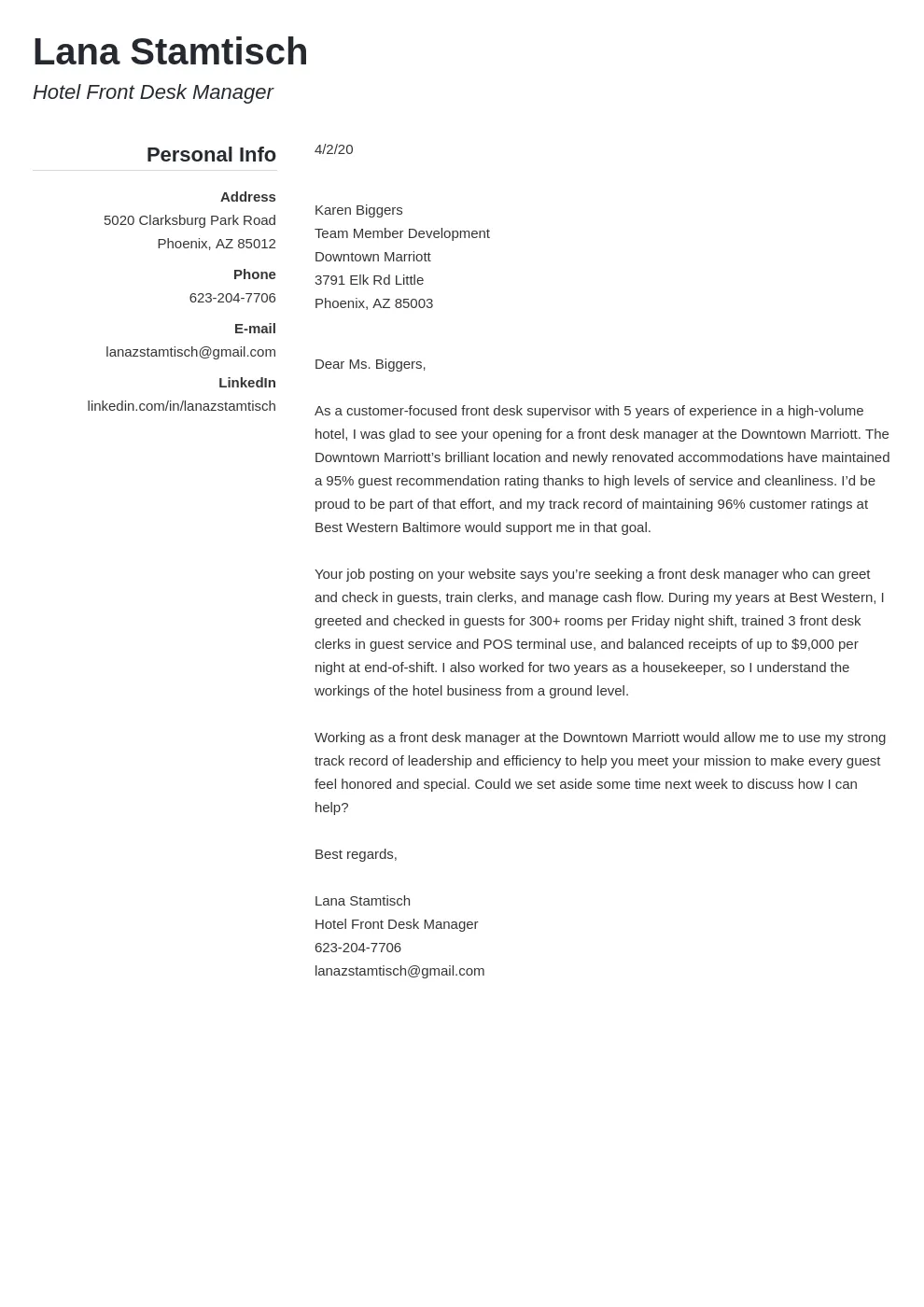
The opening paragraph is critical; it sets the tone for your entire cover letter. It should immediately grab the reader’s attention and clearly state the purpose of your letter. Begin by mentioning the specific position you are applying for and where you found the job posting. The opening paragraph should also give a brief overview of your qualifications and why you are interested in the role and the company. Try to capture the reader’s interest with a strong opening sentence that highlights your most relevant experience or skill. For instance, you might start with a compelling statement about your proven track record in guest satisfaction. Ensure that you express your enthusiasm for the role and the company right from the start. This helps the hiring manager understand your interest and encourages them to read further.
Middle Paragraphs Showcasing Achievements
The middle paragraphs of your cover letter are where you elaborate on your skills, experience, and achievements. Use this section to provide specific examples that demonstrate your ability to excel in the role. Structure your paragraphs around the key requirements outlined in the job description. Instead of merely listing your responsibilities, focus on quantifiable results. Did you increase customer satisfaction scores? Did you improve operational efficiency? Did you generate additional revenue? Make each paragraph concise and to the point, ensuring that every sentence serves a purpose. Provide clear and concise explanations of your achievements, detailing the actions you took and the outcomes you achieved. The middle paragraphs are your opportunity to create a convincing narrative that proves your suitability for the position.
Quantifying Your Accomplishments
Quantifying your accomplishments is an effective way to showcase the value you bring to a company. Instead of just stating your skills and experiences, use numbers and data to illustrate your achievements. For example, instead of saying ‘Managed customer complaints effectively,’ you could say ‘Reduced customer complaint resolution time by 20%.’ Use metrics such as percentages, dollar amounts, or specific numbers to provide tangible evidence of your successes. When describing your achievements, use the STAR method (Situation, Task, Action, Result). This method helps you structure your responses, providing context and details about your accomplishments. When possible, highlight results that directly align with the job requirements and the company’s goals. Quantifiable achievements make your cover letter more persuasive and memorable.
Highlighting Soft Skills in Hospitality
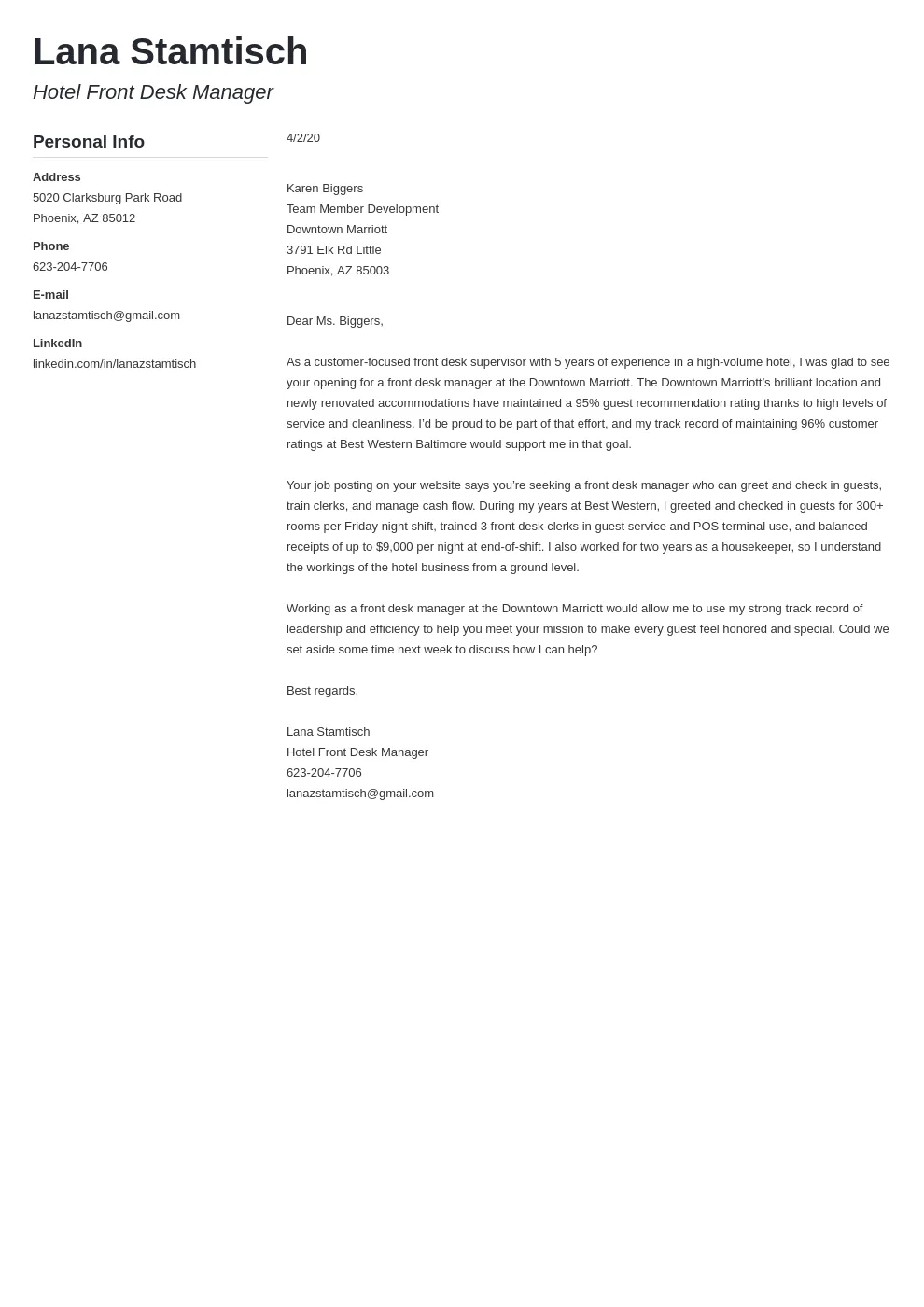
While technical skills are important, emphasizing your soft skills is crucial in the hospitality industry. Soft skills are interpersonal abilities that enable you to interact effectively with guests and colleagues. These include communication, teamwork, problem-solving, adaptability, and customer service. In your cover letter, highlight examples of how you have demonstrated these skills in the past. For instance, you might describe how you resolved a difficult customer complaint by using your communication and problem-solving skills. Include examples of how you worked in a team environment. Provide specific examples to support your claims. Soft skills are particularly valuable in the hospitality industry because they demonstrate your ability to create positive guest experiences and contribute to a harmonious work environment.
The Closing Paragraph: Call to Action
The closing paragraph should summarize your interest in the position and reiterate your enthusiasm for the opportunity. Thank the hiring manager for their time and consideration. Include a call to action, clearly stating what you want the hiring manager to do next. The most common call to action is to request an interview. Make it easy for the hiring manager to contact you by providing your contact information again. Ensure the tone is professional and enthusiastic, leaving a positive lasting impression. End your letter with a confident and proactive statement, expressing your eagerness to discuss your qualifications further. This final paragraph is your last chance to make a strong impression, and should leave a positive impression on the reader.
Proofreading and Editing Your Cover Letter
Before submitting your cover letter, proofread and edit it carefully. Errors can make your application look unprofessional, so it’s important to ensure your cover letter is free of any typos, grammatical errors, or formatting inconsistencies. Read your cover letter aloud to catch any awkward phrasing or unclear sentences. Consider asking a friend or family member to review your cover letter for a fresh perspective. They can catch errors you might have missed. Ensure the formatting is consistent throughout the document. Pay attention to the font, font size, spacing, and alignment. Proofreading and editing are crucial steps in the application process. A polished cover letter demonstrates your attention to detail and professionalism. A well-edited cover letter increases your chances of making a positive impression.
Common Mistakes to Avoid in Hospitality Cover Letters
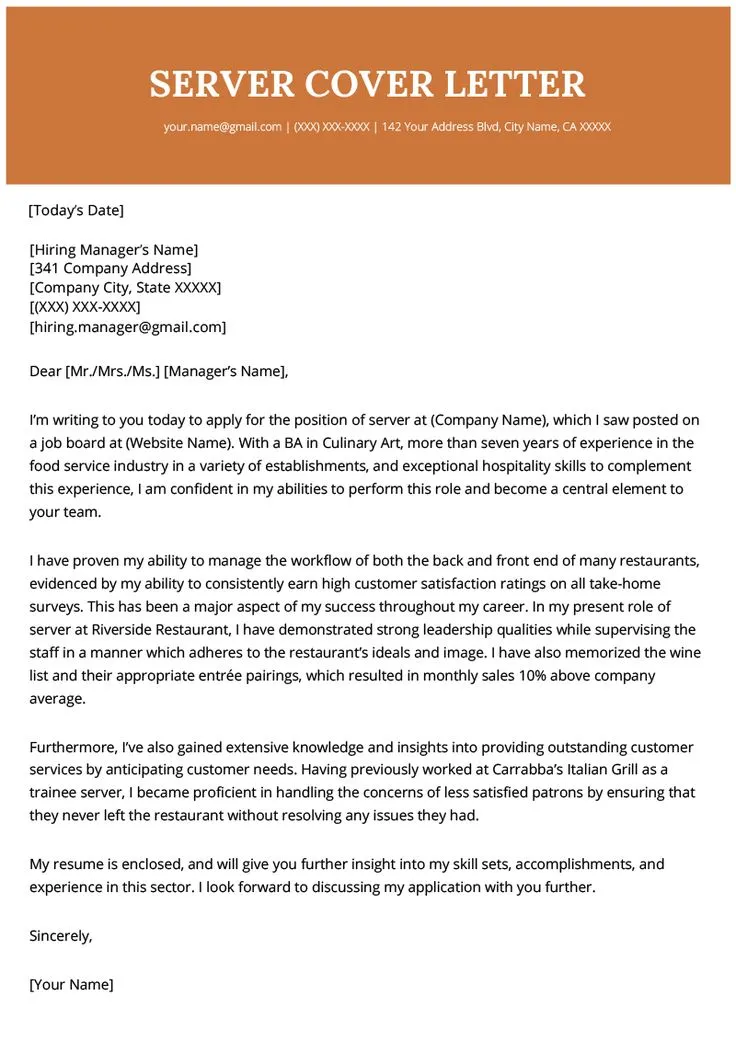
Avoiding common mistakes is essential for crafting a compelling cover letter. One common mistake is using a generic, uninspired cover letter. Tailor your cover letter to each job you apply for. Another mistake is including too much irrelevant information or repeating your resume verbatim. Instead, use your cover letter to expand on key experiences and skills. Avoid using overly casual language or slang. The tone of your cover letter should be professional. Ensure there are no grammatical errors, typos, or formatting inconsistencies. Failing to research the company or job can show a lack of interest. Always proofread your cover letter to make sure there are no mistakes. Your cover letter is your opportunity to showcase your attention to detail and enthusiasm, so avoid these common pitfalls.
Using Action Verbs Effectively
Using strong action verbs can make your cover letter more dynamic and impactful. Action verbs bring your accomplishments to life, showcasing your skills and experience in a compelling way. When describing your responsibilities and achievements, use verbs that convey action, such as ‘managed,’ ‘implemented,’ ‘created,’ ‘achieved,’ ‘developed,’ ’led,’ ’trained,’ or ‘improved.’ Avoid generic phrases that don’t provide any specific insight. For example, instead of writing ‘Responsible for customer service,’ you could write ‘Provided exceptional customer service, resolving complaints and ensuring guest satisfaction.’ When possible, quantify your accomplishments to create a clearer picture of your performance. Action verbs create a more active and persuasive cover letter.
Keywords to Include in Your Cover Letter
Including relevant keywords in your cover letter can help it get noticed by applicant tracking systems (ATS) and hiring managers. Carefully review the job description and identify the key skills, qualifications, and phrases the employer is seeking. Incorporate these keywords naturally throughout your cover letter, particularly in the skills and experience sections. Do not overstuff your cover letter with keywords, as this can make it sound unnatural. The goal is to demonstrate that your skills and experience directly align with the job requirements. Keywords can also help the hiring manager quickly identify your relevant qualifications. Use a mix of general keywords related to the industry and specific keywords from the job description. Your cover letter should demonstrate the ability to understand the role.
Examples of Strong Hospitality Cover Letters
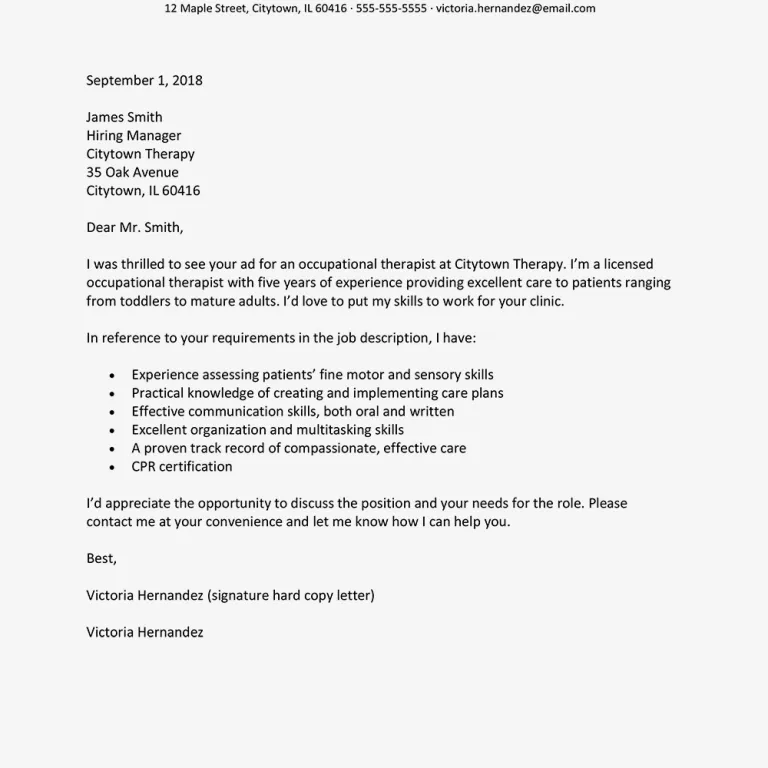
Reviewing examples of strong cover letters can provide inspiration and guidance when writing your own. Look for cover letters that are well-structured, clear, and tailored to specific jobs. Pay attention to how the candidates highlight their skills and experiences, using action verbs and providing specific examples. Analyze how they express their passion for the hospitality industry and demonstrate their understanding of the company and its culture. When you have some strong examples, you can use them as a template, adapting the content to your own skills and experiences. Be sure to make it unique and reflective of you. These examples can provide valuable insights into what works, helping you create a compelling and effective cover letter.
